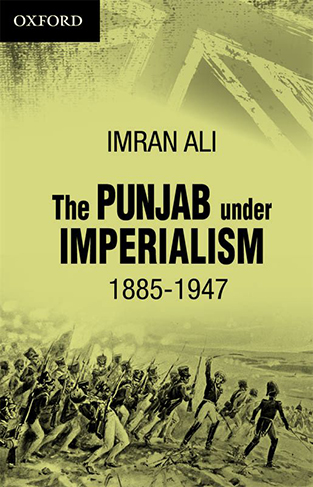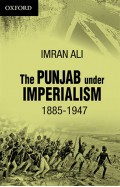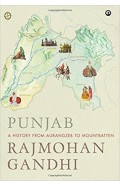The Punjab under Imperialism 1885 -1947
By: Imran Ali
-
Rs 616.50
- Rs 685.00
- 10%
You save Rs 68.50.
Due to constant currency fluctuation, prices are subject to change with or without notice.
This comprehensive survey of British rule in the Punjab demonstrates that colonial policy-making led to many of the socio-economic and political problems currently plaguing Pakistan and Indian Punjab. Subordinating development goals to its political and military imperatives, the colonial state co-operated with the dominant social classes, the members of which became the major beneficiaries of agricultural colonization. Even while the rulers tried to use the vast resources of the Punjab to advance imperial purposes, they were themselves being used by their collaborators to advance implacable private interests. Such processes effectively retarded both nationalism and social change and resulted in the continued backwardness of the region even after the departure of the British.
This comprehensive survey of British rule in the Punjab demonstrates that colonial policy-making led to many of the socio-economic and political problems currently plaguing Pakistan and Indian Punjab. Subordinating development goals to its political and military imperatives, the colonial state co-operated with the dominant social classes, the members of which became the major beneficiaries of agricultural colonization. Even while the rulers tried to use the vast resources of the Punjab to advance imperial purposes, they were themselves being used by their collaborators to advance implacable private interests. Such processes effectively retarded both nationalism and social change and resulted in the continued backwardness of the region even after the departure of the British.
Zubin Mehta: A Musical Journey (An Authorized Biography)
By: VOID - Bakhtiar K. Dadabhoy
Rs 472.50 Rs 1,050.00 Ex Tax :Rs 472.50
Punjab: A History from Aurangzeb to Mountbatten
By: Rajmohan Gandhi
Rs 712.25 Rs 1,295.00 Ex Tax :Rs 712.25
Barbarossa: How Hitler Lost the War
By: Jonathan Dimbleby
Rs 2,965.50 Rs 3,295.00 Ex Tax :Rs 2,965.50
The Hitler Years ~ Disaster 1940-1945
By: Frank McDonough
Rs 2,515.50 Rs 2,795.00 Ex Tax :Rs 2,515.50
The Origins of Political Order From Prehuman Times to the French RevolutioN
By: Francis Fukuyama
Rs 3,505.50 Rs 3,895.00 Ex Tax :Rs 3,505.50
Manning Up: How the Rise of Women Has Turned Men into Boys
By: Kay Hymowitz
Rs 646.75 Rs 995.00 Ex Tax :Rs 646.75
The Obama Syndrome: Surrender At Home War Abroad
By: Tariq Ali
Rs 1,165.50 Rs 1,295.00 Ex Tax :Rs 1,165.50
The Quest For Meaning: Developing A Philosophy Of Pluralism
By: Tariq Ramadan
Rs 1,255.50 Rs 1,395.00 Ex Tax :Rs 1,255.50
The Pakistan US Conundrum Jihadists The Military And The People The Struggle For Control
By: Yunas Samad
Rs 1,255.50 Rs 1,395.00 Ex Tax :Rs 1,255.50
An Enemy We Created: The Myth Of The Taliban Al Qaeda Merger In Afghanistan 19702010
By: Alex Strick van Linschoten
Rs 3,412.50 Rs 5,250.00 Ex Tax :Rs 3,412.50
WikiLeaks: Inside Julian Assanges War on Secrecy
By: David Leigh & Luke Harding
Rs 552.50 Rs 850.00 Ex Tax :Rs 552.50
Punjab: A History from Aurangzeb to Mountbatten
By: Rajmohan Gandhi
Rs 712.25 Rs 1,295.00 Ex Tax :Rs 712.25
Barbarossa: How Hitler Lost the War
By: Jonathan Dimbleby
Rs 2,965.50 Rs 3,295.00 Ex Tax :Rs 2,965.50
The Hitler Years ~ Disaster 1940-1945
By: Frank McDonough
Rs 2,515.50 Rs 2,795.00 Ex Tax :Rs 2,515.50
No recently viewed books available at the moment.
Zubin Mehta: A Musical Journey (An Authorized Biography)
By: VOID - Bakhtiar K. Dadabhoy
Rs 472.50 Rs 1,050.00 Ex Tax :Rs 472.50
Punjab: A History from Aurangzeb to Mountbatten
By: Rajmohan Gandhi
Rs 712.25 Rs 1,295.00 Ex Tax :Rs 712.25
Barbarossa: How Hitler Lost the War
By: Jonathan Dimbleby
Rs 2,965.50 Rs 3,295.00 Ex Tax :Rs 2,965.50
The Hitler Years ~ Disaster 1940-1945
By: Frank McDonough
Rs 2,515.50 Rs 2,795.00 Ex Tax :Rs 2,515.50














-120x187.jpg?q6)








-120x187.jpg?q6)



-120x187.jpg?q6)



